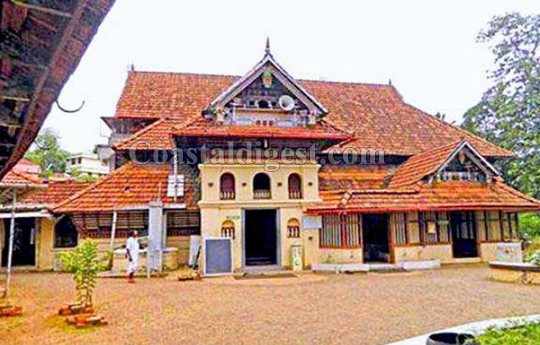Kottayam, Apr 21: The age-old Juma Masjid at Thazhathangadi, believed to be among the 11 mosques constructed by Malik bin Dinar, the eighth century religious preacher from Arabia, will, for the first time, be opened for women.

Women believers can enter the mosque on April 24 and May 8 from 8 a.m. till 12 noon and then from 1 p.m. till 3.30 p.m. and later from 4.30 p.m. till 6 p.m. The timings have been regulated so as not to interfere with the religious rites, a press note said.
The unique construction attracts tourists from far and wide, but women have not been allowed to have a peek into the richly carved interiors, made primarily of wood, so far, said C.M. Yousuf, secretary of the Thazhathangadi Muslim Jamaath, in the press note.
The Juma Masjid, considered one of the most beautiful places of religious worship, reflects the heritage of Kerala temple architectural styles and showcases the rich sculptural styles of Arabic architecture.
The mosque also houses the centuries-old sundial, sacred writings from the Quran embossed in wood, the stunning Maalikappuram and the richly carved facades and many more objects of interests.
According to Mr. Yousuf, researchers and tourists used to arrive to have a look at the unique structure, but so far women have been denied permission.
There have been appeals from the local people for such a permission. It was against this background that the Juma Masjid committee decided to allow women to enter the mosque, he said.
The Muslims who lived around this mosque played an active role in Freedom Struggle and other National Movements.
Even though the religion of Islam doesn't prohibit women from entering mosques, in India women are not allowed in most of the mosques. In Islamic countries like Kingdom of Saudi Arabia, women offer namaz in mosques.




Comments
It is Allah's command that Women should not be prevented from going to Mosque. In the time of prophet muslim women were encouraged to mosque and listen to friday sermon even if they have periods. Please remember this Surah 22.25. Where Allah state he will punish people who keep belivers from Mosque. PLEASE TRY TO SEPERATE CULTURE FROM ISLAM. If want to stay out of hell
Well said, brother shaji
@ Nida Madam.
Even in makkah & Madina there is separate facility for men and women. Some people do break this restriction, they mingle and stand for prayer. This has to be dealt by the authorities of Haram. If they fail to control this, it doesn't m
Mr Mohammed, Mangalore!
So, in your family, ladies dont perform hajj? if they perfom whether they enter masajid in makkah, madinah and other place or not ?
rightly said Brother muhammed Manglore
It is highly advisable for ladies to pray at home but it doesn't meant that they cannot pray in Masjid.....depending upon the circumstances...
Wa Fantastic Movement.
Chief Minister Hat off.
Declining Muslim women for praying in Masjid is not correct. they should be allowed to pray there but a separate place should be allocated to them as Women are not allowed to mix with men while praying. Nowhere men and women pray together. there is separate place for women everywhere. It is not right that Islam does not allow women to pray in the Masjid. People who are forcing women to allow in the Masjid are either hypocrites or less educated. As per the Sharia, her own house is more important to a woman than a Masjid. Praying by woman in the house is more acceptable than praying in the Masjid unless she is in the Market or in journey. Every Masjid should have separate place for women to pray and none should object it. However, it is useless for fighting for entry of Woman in Masjid as it is useless. those who are forcing woman entry in the masjid are non muslims or visiting masjid once in a week and on Eid days. I dont think an educated and well known Muslim woman will fight for her entry in the Masjid as she will prefer to pray in the house which is more acceptable in Islam. I request hypocrites not to waste time in unnecessary things and try to follow Islam correctly. Dont be followers of Iblees and put yourself in Jahannum.
women praying place called prayer room (musallah nisa) and for men it is called mosque (masjid).
Add new comment